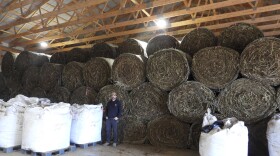Community leaders joined HempWood’s founder and employees Tuesday to celebrate the company’s addition of a second factory on its Murray campus – capitalizing on a growth in the hemp industry in the Bluegrass State and nationwide.
Sen. Rand Paul had the honor – while wearing eye protection – of performing the ceremonial “board-cutting.” In a speech prior to the cutting, Paul congratulated HempWood founder Greg Wilson and his team on achieving a new milestone for hemp production, and said he hopes to attend more hemp factory openings in the future.
HempWood opened its first factory in Calloway County six years ago producing lumber materials from the fibers of the cannabis plant. The company is also known for creating a soy-based adhesive that Wilson said is the work of Murray State University Chemistry Professor Kevin Miller. The unique adhesive is one of the keys to Wilson’s patented formula for turning hemp fibers into wood.
“It's based on the same algorithm that I wrote in college in 2003 based on the Fibonacci sequence, " Wilson said. “[It] is my compression ratio for making the optimum density, which equals your hardness, your stability and your fire resistance for building materials.”
Wilson said from start to finish the process for making HempWood is all done locally.
“Our team are farmers. We are manufacturers,” Wilson said. “Our supply chain doesn't go for more than one day drive, so everything we do here is 100% made in America.”
Wilson, who’s a Maryland-native, has a history of working with alternatives to traditional building materials. He spent over a decade working for a company in China that manufactured bamboo flooring. It was there he developed a respiratory condition due to exposure to the manufacturing adhesive formaldehyde. That experience – plus the U.S. legalization of hemp in the 2014 Farm Bill – is what inspired him to search for a safe, cost-effective alternative to traditional lumber materials. That search led him to working closely with Murray State University’s Agriculture Department.

In 2019, HempWood began hiring students from the university’s agricultural department. Several of those interns continued to work for HempWood after graduation. Austin Corn is one such alumnus who now has partial ownership of the company.
“[I] graduated college. Greg offered me a full time position, and I spent the past few years being in charge of all machinery set up and maintenance,” Corn said at the event. “Hemp breaks everything, so it always kept me busy.”
Murray State planted the first legal agricultural hemp research plot in Kentucky in 2014 – some of the first hemp plants grown in the U.S. since its cultivation was prohibited in 1970. MSU was cited by Congressman James Comer as the first university in the country to participate in the hemp pilot program.
Kentucky’s hemp industry has grown since its legalization in the 2014 Farm Bill. Farmers in the state planted 2,700 acres of hemp in 2024 according to an April 2025 report from the United States Department of Agriculture. That number is nearly double the previous year when only 1,300 acres of hemp were planted. In total, according to the USDA report, over 4 million pounds of hemp was produced in the Bluegrass State last year – making up one-fifth of the country’s total production.
Hemp is still a subject of debate years after that first harvest. Questions regarding the cultivation of the cannabis sativa plant were clarified in later legislation, but the disagreements around its regulation continue today.
Kentucky’s two senators have disagreed in recent weeks regarding hemp legislation. Sen. Mitch McConnell proposed legislation earlier this year that would close what he calls a “loophole” in the 2018 Farm Bill he championed. The new legislation would direct the Food and Drug Administration to set "quantifiable limits” for delta-9-tetrahydrocannabinol (THC) in hemp-derived cannabinoid products.
On Tuesday, Paul said he shares in the concerns of other hemp advocates who worry McConnell's proposal would wound the multi-billion dollar industry.

“The amendment that's being offered in Washington would cut the THC limit in half, and I think it might make it difficult to grow. But, it also might disrupt the market,” Paul said. “It’s a $25 billion industry now. We need to be real careful and thoughtful about changing the rules.”
Paul said he takes issue particularly with the testing of plants and argues the regulations around hemp should be similar to regulating crops used in alcohol production.
“We make alcohol from corn, but we don't regulate how much alcohol is in the corn,” Paul said. “You regulate the alcohol. You regulate what's being consumed…. there's no reason to regulate the plant.”
Paul has sponsored legislation regarding changes to the 2018 Farm Bill in the past. In June, he introduced the Hemp Economic Mobilization Plan (HEMP) Act of 2025. The proposal would increase the current legal limit for THC from 0.3% to 1% and require hemp transporters to keep documentation certifying the plants they carry meet legal requirements.





